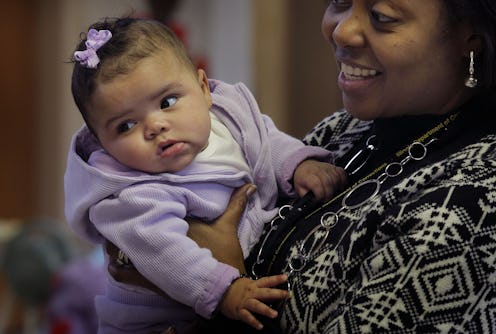Life
Take This Ticking Biological Clocks!
As modern women, we've all been told to "lean in" by continuing to prioritize our careers over our loudly ticking biological clocks — and it looks like many of us are actually taking this advice. U.S. women are having children later in life, new statistics from the Centers for Disease Control confirm. But how big is this shift, and why does it matter?
In 1970, fewer than 3 in 1,000 women gave birth to their first baby between the ages of 35-39. Today, that number is around 12 women in 1,000. Although childlessness among American women has been on the rise in general, that still represents a quadrupling of first-time motherhood in mid-to-late 30's women, in a period of under 50 years. Remember, that means those first-time mothers will only be older the next time, if and when they choose to try for another child — but the odds of getting pregnant each month decline somewhat as a woman ages (if not as much as we've been told).
First-time birth is also up in the over-40 set: in 1970, almost no women gave birth for the first time between the ages of 40 and 44, but in 2012 close to 3 in 1,000 women aged 40-44 did. And according to Pew Research, average age of first birth is up a year, from 24 in 1990 to 25 in 2008. A greater share of newborns are now born to women over 35 than to teenagers, another change between 1990 and 2008.
Why should we care about the rising age of first-time mothers? Well, on the one hand, women who successfully delay childbearing for decades (thanks, Pill!) and become mothers on purpose later in life may do right by their babies, because they're often better educated and in a better financial and family situation to raise them. On the other hand, there are some health risks associated with later childbearing – most notably, increased risks for Down syndrome and maybe autism – but these are not yet fully understood.
Personally, I worry that that motherhood in the United States is splitting into two tracks. First, there are younger, low-income women who, whether they became pregnant accidentally or not, have decided to go ahead and have their children now and raise them alone, because their economic prospects don't look great in the future and sadly would not be improved by the addition of an unreliable, low-income father to the mix. Second, there are older women who spend 10-20 years investing in their educations and careers, and who ultimately marry similarly high-status men. These couples have a few children and are able to pour resources into them.
Many families are somewhere in between these two ends of the spectrum. But it's not hard to see that individual choices add up to bigger social shifts, and that this maternal age trend touches widely on issues of feminism, public health, income inequality, and even social justice. We'll just have to wait and see how much older American maternal age can go.
